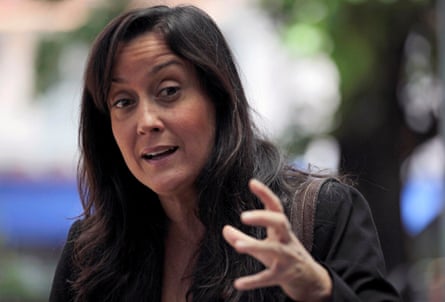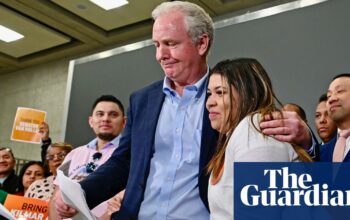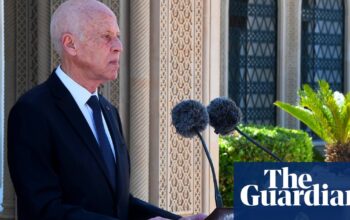Human rights organizations are urging the Venezuelan authorities to stop their harsh treatment of civil society, which included imprisoning a well-known lawyer and expelling a UN human rights office from Caracas for speaking out against the lawyer’s arrest.
The detention of Rocío San Miguel, a 57-year-old lawyer and military specialist, has caused alarm among onlookers. They believe that Venezuela is heading into a more oppressive period with the aim of suppressing opposition to the government leading up to the upcoming elections.
After the UN human rights office condemned San Miguel’s detention, the government demanded that its employees depart the country within 72 hours.
Valentina Ballesta, a researcher for South America at Amnesty International, stated that the government’s decision to remove the UN high commissioner and his office is another effort to distance itself from international oversight of its human rights performance. Ballesta emphasized that the international community should continue to bring attention to this issue.

On February 9th, San Miguel was apprehended at an airport near Caracas while preparing to travel to Miami for a vacation with her daughter.
For two days, her family did not receive any updates on her location until they were told that she was being accused of planning to assassinate the Venezuelan leader, Nicolás Maduro. The police also arrested five of her family members, including two former partners.
The family of San Miguel claims that she has been denied the right to choose a lawyer to represent her in response to the accusations.
Gonzalo Himiob, a lawyer and founding member of Foro Penal, an NGO that monitors political prisoners, explains that in Venezuela, it has been a regular occurrence to restrict the right to legal defense. However, he also points out that there is now a new tactic being used to prevent any form of defense: isolating detainees from their families and lawyers.
Since 2014, as Venezuela’s economic crisis worsened, the government has frequently employed state institutions, such as the courts and intelligence agencies, to suppress dissenting voices.
The United Nations human rights council has accused Maduro and other high-ranking officials in Venezuela of engaging in acts of torture, kidnapping, and extrajudicial killings that amount to crimes against humanity.
According to advocacy organizations, the government has recently implemented a more concerning approach to restrict civic freedoms in light of upcoming elections.
According to reports, in addition to imprisoning critics on unfounded terrorism charges, the government is also reportedly detaining their associates and loved ones.
A woman was subjected to torture and handed a 30-year prison term for merely sharing a taxi with an individual accused of conspiring against the state.
According to Himiob, the suppression may be more targeted now, but it is also becoming increasingly harsh.
Himiob stated that there was a state-media campaign that was both intense and systematic, in addition to allegations of conspiracy being made.
Bypass the advertisement for the newsletter.
after newsletter promotion
The apprehension of San Miguel was unexpected for specialists. Her public image, along with her Spanish citizenship and global relationships, were previously believed to be enough to protect her from Maduro’s authoritarian regime.
San Miguel is renowned for her role as a moderate political figure and is most recognized for her studies that have revealed instances of corruption within the Venezuelan military.
According to Phil Gunson, an analyst with the International Crisis Group, it is unlikely that anyone would believe that Rocio should have been involved in this seemingly absurd coup attempt. The purpose of this action is clearly to warn civil society that they are not immune to arbitrary arrests.
Experts state that Maduro is intensifying his attack on the general public to secure a win in the promised “fair and free” elections to the opposition in exchange for lifting US sanctions.
In January, three assistants of the opposing leader María Corina Machado were detained for treason, while the supreme court, which is aligned with the government, upheld the prohibition on Machado’s candidacy.
The Venezuelan legislature is anticipated to approve a legislation that would control civil society organizations, which United Nations experts warn could permanently limit the country’s civic and democratic freedoms.
Ballesta stated that the government is making efforts to overcome the remaining resistance.
Advocacy organizations are urging governments to condemn the detention of San Miguel and the removal of the UN’s human rights office.
Last week, a spokesperson from the White House expressed concern about the arrest of San Miguel.
Source: theguardian.com


